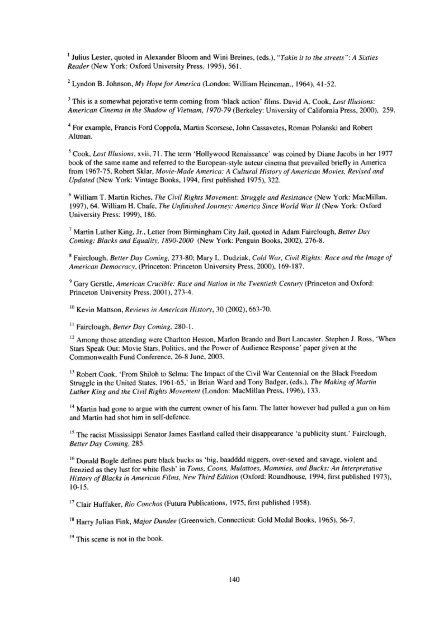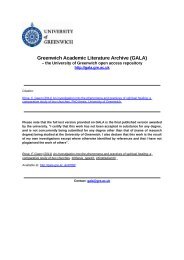1 Julius Lester, quoted in Alexander Bloom and Wini Breines, (eds.), "Takin it to the streets": A SixtiesReader (New York: Oxford University Press, 1995), 561.2 Lyndon B. Johnson, My Hope for America (London: William Heineman., 1964), 41-52.3 This is a somewhat pejorative term coming from 'black action' films. David A. Cook, Lost Illusions:American Cinema in the Shadow of Vietnam, 1970-79 (Berkeley: University of California Press, 2000), 259.4 For example, Francis Ford Coppola, Martin Scorsese, John Cassavetes, Roman Polanski and RobertAltman.5 Cook, Lost Illusions, xvii, 71. The term 'Hollywood Renaissance' was coined by Diane Jacobs in her 1977book of the same name and referred to the European-style auteur cinema that prevailed briefly in Americafrom 1967-75, Robert Sklar, Movie-Made America: A Cultural History of American Movies, Revised andUpdated (New York: Vintage Books, 1994, first published 1975), 322.6 William T. Martin Riches, The Civil Rights Movement: Struggle and Resistance (New York: MacMillan,1997), 64. William H. Chafe, The Unfinished Journey: America Since World War II (New York: OxfordUniversity Press: 1999), 186.7 Martin Luther King, Jr., Letter from Birmingham City Jail, quoted in Adam Fairclough, Better DayComing: Blacks and Equality, 1890-2000 (New York: Penguin Books, 2002), 276-8.8 Fairclough, Better Day Coming, 273-80; Mary L. Dudziak, Cold War, Civil Rights: Race and the Image ofAmerican Democracy, (Princeton: Princeton University Press, 2000), 169-187.9 Gary Gerstle, American Crucible: Race and Nation in the Twentieth Century (Princeton and Oxford:Princeton University Press, 2001), 273-4.10 Kevin Mattson, Reviews in American History, 30 (2002), 663-70.1 ' Fairclough, Better Day Coming, 280-1.12 Among those attending were Charlton Heston, Marion Brando and Burt Lancaster. Stephen J. Ross, 'WhenStars Speak Out: Movie Stars, Politics, and the Power of Audience Response' paper given at theCommonwealth Fund Conference, 26-8 June, 2003.13 Robert Cook, 'From Shiloh to Selma: The Impact of the Civil War Centennial on the Black FreedomStruggle in the United States, 1961-65,' in Brian Ward and Tony Badger, (eds.), The Making of MartinLuther King and the Civil Rights Movement (London: MacMillan Press, 1996), 133.14 Martin had gone to argue with the current owner of his farm. The latter however had pulled a gun on himand Martin had shot him in self-defence.15 The racist Mississippi Senator James Eastland called their disappearance 'a publicity stunt.' Fairclough,Better Day Coming, 285.16 Donald Bogle defines pure black bucks as 'big, baadddd niggers, over-sexed and savage, violent andfrenzied as they lust for white flesh' in Toms, Coons, Mulattoes, Mammies, and Bucks: An InterpretativeHistory of Blacks in American Films, New Third Edition (Oxford: Roundhouse, 1994, first published 1973),10-15.17 Clair Huffaker, Rio Conchas (Futura Publications, 1975, first published 1958).18 Harry Julian Fink, Major Dundee (<strong>Greenwich</strong>, Connecticut: Gold Medal Books, 1965), 56-7.19 This scene is not in the book.140
20 Enoch, in Friendly Persuasion (1956), asks for, and is given, a gun to help defend the community againstthe southern raiders, but he is not shown fighting. Rau-Ru in Band of Angels is just pursuing white planterswho have disobeyed the orders of the Union commander.21 The mixing of white and African American soldiers is an anachronism, as it did not begin to happen untilTruman's Executive Order 9981 in 1948.22 Johnson, My Hope for America, 35, 43. The Immigration Reform Act overturned the hugely restrictiveNational Origins Act of 1924 and dramatically changed the composition of future immigration.23 Loving v. Virginia (1967).24 Eric Foner, The Story of American Freedom (New York: W. W. Norton, 1998), 281.25 Cook, From Shiloh to Selma: 145.26 Gary Gerstle, 'Immigration and Ethnicity in the American Century' in Harvard Sitkoff, (ed.), Perspectiveson Modern America: Making Sense of the Twentieth Century (New York: Oxford University Press, 2001),287.27 David Goldfield, Still Fighting the Civil War (Baton Rouge: Louisiana State University Press, 2002), 249.28 William H. Chafe, The Unfinished Journey: America since World War II (New York: Oxford UniversityPress, 1999, first published 1986), 319.29 Chafe, The Unfinished Journey, 337.30 Thomas Borstleman, The Cold War and the Color Line: American Race Relations in the Global Arena(Cambridge, Massachusetts: Harvard University Press, 2001), 194.31 Based upon the novel Fields of Honor by Will Henry (1960).32 Variety, 15 May, 1968.33 Riches, The Civil Rights Movement, 91.34 Stephen Grant Meyer, As Long as They Don't Move Next Door: Segregation and Racial Conflict inAmerican Neighbourhoods (Lanham, Maryland: Rowman and Littlefield, 2000) reviewed by A. ScottHenderson in Reviews in American History, 29 ( March 2001), 119-25; Thomas J. Sugure, 'Crabgrass-RootsPolitics: Race, Rights and the Reaction Against Liberalism in the Urban North, 1940-1964' in Jack E. Davis,(ed.), The Civil Rights Movement (Maiden, Massachusetts: Blackwell, 2001), 65-83; Fairclough, Better DayComing, 303.35 Maurice Isserman and Michael Kazin, America Divided: The Civil War in the 1960s (New York: OxfordUniversity Press, 2000), 188-200.36 A survey in 1968 for the Motion Picture Association of America found that 48% of the audience was aged16-24 years. Cook, Lost Illusions, 67.37 Cook, Lost Illusions, 262.38 Kevern Verney, Black Civil Rights in America (New York: Routledge, 2000), 81.39 For example Sidney Poitier in Guess Who's Coming to Dinner (1961) and In the Heat of the Night (1967).40 The Production Code had been replaced in 1968 by a four category voluntary ratings system aimed toprotect minors but open to negotiation. Responsibility was now placed with the parents rather than thefilmmakers, distributors and theatre managers.41 Los Angeles Times, 25 December 1970.141
- Page 1 and 2:
Greenwich Academic Literature Archi
- Page 3:
REEL WARS: COLD WAR, CIVIL RIGHTSAN
- Page 6 and 7:
ABSTRACTThis study is an examinatio
- Page 8 and 9:
ABBREVIATIONSAMPASAHRBirthCommissio
- Page 10 and 11:
Historians using film as a resource
- Page 12 and 13:
dominated America's foreign policy
- Page 14 and 15:
Mary L. Dudziak explores this relat
- Page 17 and 18:
pure and simple' and were therefore
- Page 19 and 20:
historical texts. Hayden White comp
- Page 21 and 22:
Historians, history films and film
- Page 23 and 24:
How have sympathetic film historian
- Page 25 and 26:
Therefore historians can, with over
- Page 27 and 28:
identity and these were taken as th
- Page 29 and 30:
21 George F. Custen, 'Hollywood and
- Page 31 and 32:
63 Rosenstone, The Historical Film,
- Page 33 and 34:
of Honor dedicated to, and listing,
- Page 35 and 36:
War.....[it] defined us as to what
- Page 37 and 38:
The Civil War and popular cultureJu
- Page 39 and 40:
memory,53 the place where Union and
- Page 41 and 42:
Despite being a new medium Hollywoo
- Page 43 and 44:
From the late 1940s Hollywood was u
- Page 45 and 46:
1 William Faulkner, Requiem for a N
- Page 47 and 48:
36 Blight, Race and Reunion, 77, 81
- Page 49 and 50:
mainly composed of members of the w
- Page 51 and 52:
there was cowardice, it was either
- Page 53 and 54:
This was another Lost Cause myth -
- Page 55 and 56:
stuff with plenty of clothes, rich
- Page 57 and 58:
women into or within slavery. 47 Th
- Page 59 and 60:
departure when, in the discussion o
- Page 61 and 62:
1 William Dean Howells, Los Angeles
- Page 63 and 64:
37 Melvyn Stokes, The Civil War in
- Page 65 and 66:
All races and religions, that's Ame
- Page 67 and 68:
Hollywood almost abandoned Civil Wa
- Page 69 and 70:
charged with disloyalty and silence
- Page 71 and 72:
ecover from the HUAC investigations
- Page 73 and 74:
a living. The daughters grow up to
- Page 75 and 76:
Gettysburg. 'You know,' says Henry,
- Page 77 and 78:
combining two great myths, which co
- Page 79 and 80:
(1948), Tom Dunson's style of autoc
- Page 81 and 82:
Patriotism became a white attribute
- Page 83 and 84:
In the absence of African Americans
- Page 85 and 86:
(Horizons West) and businessmen (An
- Page 87 and 88:
year later, and there was no lead f
- Page 89 and 90:
20 Mary L. Dudziak, Cold War, Civil
- Page 91 and 92:
56 Richard White, 'Western History'
- Page 93 and 94:
7 have seen the promised land.' 'Th
- Page 95 and 96:
those between whites and African Am
- Page 97 and 98: change, to forget what made him, he
- Page 99 and 100: eported that the film had 'already
- Page 101 and 102: campaigning for Lincoln. John's rea
- Page 103 and 104: lack/white relationships, in Civil
- Page 105 and 106: McCarthy discredited and a more rel
- Page 107 and 108: dispute which once divided our nati
- Page 109 and 110: pressure, continued to hold. The me
- Page 111 and 112: discrimination, attempts at univers
- Page 113 and 114: talks about Lincoln pleading that '
- Page 115 and 116: creativity. The Confederates use a
- Page 117 and 118: police in Birmingham and Kennedy's
- Page 119 and 120: 1 Martin Luther King Jr.'s, speech,
- Page 121 and 122: 44 Blight, Race and Reunion, 8-11,
- Page 123 and 124: - self-belief, reasons for fighting
- Page 125 and 126: Sexploitation - which reversed the
- Page 127 and 128: would surely recognise the Mexicans
- Page 129 and 130: There are similar examples in Major
- Page 131 and 132: on working class whites nor receive
- Page 133 and 134: The conflict between civil rights a
- Page 135 and 136: e trusted from the wiles of the mis
- Page 137 and 138: field-hands are too valuable an inv
- Page 139 and 140: moving the civil rights agenda to a
- Page 141 and 142: McBurney, even though he is wounded
- Page 143 and 144: Most reviewers were sympathetic, se
- Page 145 and 146: conservatism,' as a natural ally fo
- Page 147: By the early 1970s, Hollywood's opt
- Page 151 and 152: 62 Johnson called what happened the
- Page 153 and 154: The world is white no longer; and i
- Page 155 and 156: proceed with civil rights legislati
- Page 157 and 158: would have been counter to the poli
- Page 159 and 160: mid-1990s was rejected as the compa
- Page 161 and 162: those historians who were contestin
- Page 163 and 164: 1 James Baldwin, Stranger in the Vi
- Page 165 and 166: 39 Robert Brent Toplin, Reel Histor
- Page 167 and 168: 1210mmmto3sCT>The number of America
- Page 169 and 170: There is a third problem - that of
- Page 171 and 172: the Library of Congress and the Uni
- Page 173 and 174: mainly contain copies of correspond
- Page 175 and 176: killing. There were two other areas
- Page 177 and 178: are 'no compensating moral values a
- Page 179 and 180: epresented.' 32 However, this was t
- Page 181 and 182: Reference has already been made to
- Page 183 and 184: It is in the final period that anti
- Page 185 and 186: 22 Letter from Shurlock to William
- Page 187 and 188: Year Director Company190819091910Ba
- Page 189 and 190: 191119121912Grant and LincolnHe Fou
- Page 191 and 192: 19131913Call to Arms, TheCarpenter,
- Page 193 and 194: 1915 Birth of a Nation, TheColonel
- Page 195 and 196: 19341935193619371938193919401941194
- Page 197 and 198: Searchers, TheShowdown at AbileneTh
- Page 199 and 200:
Alien, Robert C., and Douglas Gomer
- Page 201 and 202:
Cassidy, John M., Civil War Cinema:
- Page 203 and 204:
Foner, Eric, Who Owns History, (New
- Page 205 and 206:
Landy, Marcia, (ed.), The Historica
- Page 207 and 208:
Prince, Stephen, A New Pot of Gold:
- Page 209 and 210:
Sternsher, Bernard, Consensus, Conf
















